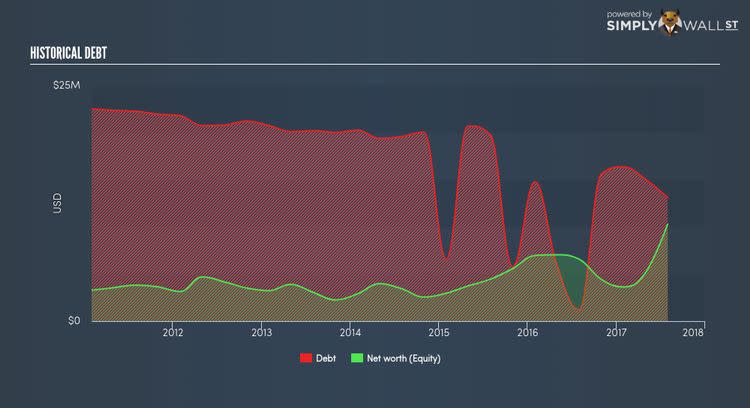How Financially Strong Is InnSuites Hospitality Trust (IHT)?

While small-cap stocks, such as InnSuites Hospitality Trust (AMEX:IHT) with its market cap of USD $19.64M, are popular for their explosive growth, investors should also be aware of their balance sheet to judge whether the company can survive a downturn. Why is it important? A major downturn in the energy industry has resulted in over 150 companies going bankrupt and has put more than 100 on the verge of a collapse, primarily due to excessive debt. These factors make a basic understanding of a company’s financial position of utmost importance for a potential investor. Here are a few basic checks that are good enough to have a broad overview of the company’s financial strength. See our latest analysis for IHT
Does IHT generate enough cash through operations?
There are many headwinds that come unannounced, such as natural disasters and political turmoil, which can challenge a small business and its ability to adapt and recover. These adverse events bring devastation and yet does not absolve the company from its debt. Fortunately, we can test the company’s capacity to pay back its debtholders without summoning any catastrophes by looking at how much cash it generates from its current operations. In the case of IHT, operating cash flow turned out to be -0.08x its debt level over the past twelve months. This means what IHT can generate on an annual basis, which is currently a negative value, does not cover what it actually owes its debtors in the near term. This raises a red flag, looking at IHT’s operations at this point in time.
Can IHT meet its short-term obligations with the cash in hand?
What about its other commitments such as payments to suppliers and salaries to its employees? In times of adverse events, IHT may need to liquidate its short-term assets to pay these immediate obligations. We test for IHT’s ability to meet these needs by comparing its cash and short-term investments with current liabilities. Our analysis shows that IHT does have enough liquid assets on hand to meet its upcoming liabilities, which lowers our concerns should adverse events arise.
Is IHT’s level of debt at an acceptable level?
Debt-to-equity ratio tells us how much of the asset debtors could claim if the company went out of business. IHT’s debt-to-equity ratio exceeds 100%, which means that it is a highly leveraged company. This is not a problem if the company has consistently grown its profits. But during a business downturn, as liquidity may dry up, making it hard to operate.
Next Steps:
Are you a shareholder? IHT’s cash flow coverage indicates it could improve its operating efficiency in order to meet demand for debt repayments should unforeseen events arise. Though, its high liquidity means the company should continue to operate smoothly in the case of adverse events. Given that its financial position may change. I recommend keeping on top of market expectations for IHT’s future growth on our free analysis platform.
Are you a potential investor? With a high level of debt on its balance sheet, IHT could still be in a financially strong position if its cash flow also stacked up. However, this isn’t the case, and there’s room for IHT to increase its operational efficiency. However, the company exhibits an ability to meet its near term obligations should an adverse event occur. I encourage you to continue your research by taking a look at IHT’s past performance analysis on our free platform to conclude on IHT’s financial health.
To help readers see pass the short term volatility of the financial market, we aim to bring you a long-term focused research analysis purely driven by fundamental data. Note that our analysis does not factor in the latest price sensitive company announcements.
The author is an independent contributor and at the time of publication had no position in the stocks mentioned.

